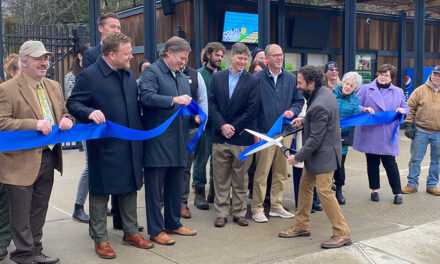Published February 22, 2019
MELROSE — Peter Mortimer, the longtime Ward 6 alderman, isn’t crazy about bringing a recreational marijuana-related business to the downtown.
Mortimer has filed an order, which the aldermen sent to their Appropriations Committee Tuesday night, that would limit the area where pot shops can operate to the Route 99 corridor only.
Recently, residents decried allowing such an operation to Washington Street, where city planners had proposed putting one of a maximum of two that could set up shop in Melrose. So that idea was scrapped, and officials turned their eyes to the corresponding zoning district along Main Street, basically from Grove Street north to Hospital Square.
People in Melrose and in other communities throughout the state are grappling with how to operate in a legalized adult-use marijuana world that is still in its infancy.
There is money to be made off the legalized pot industry by cash-strapped municipals and many Melrose leaders want in.
The downtown Main Street site alternative came up after an originally-mentioned stretch of Washington Street on the Malden line drew much flak from residents, who said traffic would increase and their safety would be endangered if a recreational marijuana facility went in. There is also a daycare facility in the neighborhood.
Two adult-use recreational marijuana facilities are allowed in Melrose, and officials have made it clear that receiving tax money realized from having two in the city instead of just one would be preferred.
A location that is not in dispute is along Route 99, where a medical marijuana facility called Garden Remedies is already open and said to be doing great business.
By way of background, Anne DeSouza-Ward, Planning Board chairwoman, wrote in a very detailed memo to Mayor Gail Infurna and the aldermen that the originally proposed zoning amendment came to them following a Planning Board vote on November 26.
“The purpose of this amendment is to regulate marijuana establishments following the end of the temporary moratorium on this use and to make minor modifications to the regulations for registered marijuana dispensaries (RMDs),” wrote DeSouza-Ward.
“Residents of the Commonwealth of Massachusetts voted to authorize the adult use of recreational marijuana and the licensing of marijuana establishments during the general election on November 8, 2016 as a part of the ballot initiative known as Question 4. After a series of legislative amendments, the ballot initiative became Massachusetts General Law Chapter 94G, Regulation of the Use and Distribution of Marijuana Not Medically Prescribed. This law established a five-person Cannabis Control Commission (CCC) to draft regulations, issue and renew licenses for marijuana establishments, promote equity considerations, and more. The CCC published its final regulations, 935 CMR 500.000: Adult Use of Marijuana, in the Massachusetts Register on March 23, 2018.
“Melrose residents voted 51.6 percent to 48.4 percent on Question 4, with the majority in favor of authorizing adult use marijuana. In order to give the City time to study and address the complex legal, planning, and public safety issues associated with adult use marijuana, the Board of Aldermen approved Ordinance No. 2017-130 on August 21, 2017 to enact a temporary moratorium on recreational marijuana establishments. The moratorium is permitted through December 31, 2018. In order to prepare for the expiration of the moratorium, Planning Staff and members of the Planning Board’s Zoning Subcommittee met multiple times during the fall of 2018 to draft zoning regulations for recreational marijuana.
“On August 21, 2017, the Board of Aldermen also approved Ordinance No. 2017-129, which regulates registered marijuana dispensaries in the City of Melrose. This amendment to the Melrose Zoning Ordinance (MZO) set policies and procedures for the regulation of medical marijuana, including the establishment of a special permit process for approving RMDs in the BB and I Zoning Districts. Since the zoning was created, the Planning Board (the Special Permit Granting Authority) has approved one RMD special permit for Garden Remedies at 732 Newburyport Turnpike, which is now open for business.
“Along with developing legislation for recreational marijuana, the Massachusetts Legislature has also created additional laws related to medical marijuana that are meant to reconcile inconsistencies between the two programs. The major change to the Commonwealth’s medical program is that it has been moved from within the Department of Public Health (DPH) to the Cannabis Control Commission. As such, the former regulations under 105 CMR 725.000 are being transferred to 935 CMR 501.000: Medical Use of Marijuana. Prior to transferring the medical program to the CCC, DPH issued guidance for RMDs who wish to convert to domestic business corporations as the new laws no longer require RMDs to be not-for-profit entities. The Cannabis Control Commission has also issued draft regulations for 935 CMR 502.000: Colocated Adult-Use and Medical-Use Marijuana Operations.
“One of the recommended amendments proposed herein would modify the definition of ‘Registered Marijuana Dispensary’ in the MZO to better align with the updated regulations for medical marijuana establishments. The modified definition also removes the reference to a nonprofit entity.
“As it relates to recreational marijuana, the Planning Board proposes adding a new Section to the Melrose Zoning Ordinance: Section 235-73.4. Marijuana Establishments. Under this Section, the Planning Board would be authorized to grant Special Permits pursuant to Section 235-61 (Special Permit Granting Authorities). This Section outlines the process for regulating non- medical marijuana establishments, including provisions around location, operation, signage, and security and the specific findings that must be made before the Planning Board may issue an approval. Similar to the process for regulating RMDs, this process is clear and comprehensive, and allows for input from the public and City officials.
“While registered marijuana dispensaries refer to businesses that grow, process, and sell medical marijuana, the definition of ‘Marijuana Establishments’ specifically refers to businesses engaged in recreational marijuana uses.
“The proposed zoning amendment introduces a number of new uses related to marijuana and recreational marijuana, such as marijuana retailers, cultivators, testing labs, and more. Each of the marijuana establishment types requires a separate license from the CCC and, in the case that one or more different types of marijuana establishments are proposed at one location, the Planning Board recommends requiring a Special Permit for each establishment type.
“Like with the zoning for RMDs, the intent is to create a process similar to Site Plan Review that will address the specific concerns related to marijuana establishments. The existing Site Plan Review process does not fully address the concerns unique to marijuana establishments; therefore, the Planning Board proposes to implement the Special Permit process to regulate the use and exempt the use from Site Plan Review (Section 235-16.1.B). The Special Permit will enable the City to have a significant amount of oversight in the siting, design, placement, security, safety, monitoring, modification, and removal of this use.
“One difference in the Special Permit requirements for marijuana establishments is that their application must include a more formalized Operation & Management Plan and Security Plan (which is not required at the application phase for RMDs) and, as a condition of the Special Permit, a written Emergency Response Plan must be filed with the Melrose Fire Department and the Melrose Police Department that includes employee roles and responsibilities, locations of fire suppression systems, evacuation routes, and meeting locations during an emergency.
“The Zoning Subcommittee carefully considered the issue of where to allow marijuana establishments, particularly marijuana retailers, and ultimately selected the Extensive Business (BB) District and the Industrial (I) District along the Newburyport Turnpike…This decision was driven in part by the regulation that recommends siting marijuana establishments outside a radius of 500 feet from schools that serve kindergarten through 12th grade, whether public or private. While the regulations for RMDs allowed a 500-foot buffer from all places that children commonly congregate, like daycare centers and parks, regulations for marijuana establishments are less restrictive and only allow the buffer from schools.
“The zoning districts selected in the proposed amendment where retailers will be allowed are all outside of these buffer zones and are transit accessible, which should minimize issues related to traffic and parking. Since the non-retail marijuana establishment types are expected to have limited impacts on their surrounding areas, the Planning Board supports allowing them in all Business (BA-1/BA-2/BB/BB-1/BC/BD) Districts and the Industrial (I) District.
“Chapter 94G § 3(a) of the Massachusetts General Laws permits municipalities to cap the number of marijuana retailers at 20% of the number of package stores in the community. While this means that the City of Melrose could cap the number of retailers at one, the Planning Board recommends capping the number at two in order to better serve the market for the area, encourage competition, and generate additional revenue for the City. Marijuana retailers are the only establishment type that can be capped; uses like testing labs and research facilities cannot be capped.
“The Planning Board recommends removing Registered Marijuana Dispensary’ from its current location in Section 235-17 (Table of Uses and Parking Regulations) of the MZO and creating a new category for ‘Marijuana-Related Uses.’ This category would not only include RMDs, but also marijuana cultivators, product manufacturers, research facilities, retailers, testing laboratories, and transportation and distribution facilities.
“In accordance with M.G.L., Chapter 40A, Section 5, all proposed zoning amendments received by the Aldermen shall be submitted to the Planning Board within 14 days for review and to schedule a public hearing. The Board of Aldermen and the Planning Board are required to hold public hearings within 65 days. The Planning Board would welcome a joint public hearing with the Board of Aldermen. After the hearing, the Planning Board has 21 days to submit a report with recommendations to the Board of Aldermen. The Board of Aldermen must wait 21 days or until they receive the report from the Planning Board before holding a vote,” the memo concludes.
The aldermen must vote by mid-April.




